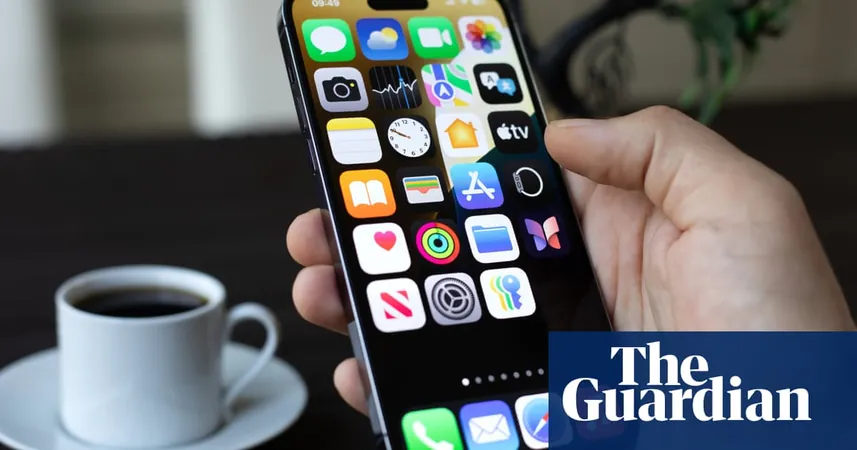
Apple to Revamp Flawed AI News Feature After Widespread Inaccuracies
2025-01-07
Author: Noah
Introduction
In a troubling development, Apple has announced plans to update an artificial intelligence feature on its latest iPhones that has been responsible for disseminating misleading news alerts. Among the most notable inaccuracies were false alerts suggesting that a man accused of murdering a U.S. insurance executive had shot himself and that tennis superstar Rafael Nadal had publicly declared he was gay.
Software Update Plans
The tech giant confirmed it is working on a software update aimed at providing clearer indications when news notifications originate from its Apple Intelligence system. This update is expected to be available in the coming weeks.
BBC's Formal Complaint
This move comes on the heels of a formal complaint raised by the BBC last December regarding erroneous alerts linked to its brand. One incident reported that Luigi Mangione, who is currently facing charges for the death of UnitedHealthcare CEO Brian Thompson, had taken his own life. In reality, Mangione remains alive and incarcerated in Brooklyn.
Recent Inaccuracies
The problem resurfaced last Friday when Apple's AI incorrectly summarized information from the BBC, falsely indicating that Nadal had come out as gay and announcing that Luke Littler had won the PDC World Darts Championship hours before the event had even occurred.
BBC's Response and Industry Concerns
The BBC responded critically, stating, "These AI summarizations by Apple do not reflect—and in some cases completely contradict—the original BBC content. It is critical that Apple urgently addresses these issues as the accuracy of our news is essential in maintaining trust."
The BBC is not alone in experiencing these issues; in November, a journalist from ProPublica flagged a misleading Apple AI summary that falsely proclaimed the arrest of Israeli Prime Minister Benjamin Netanyahu, misrepresenting the content from the New York Times.
Apple's Introduction of AI Feature
This flawed AI feature was introduced to a select group of newer iPhones in December as part of Apple's initiative to compete in a fast-evolving landscape of generative AI services. It is currently available on devices such as the iPhone 16, 15 Pro, and 15 Pro Max, along with select iPads and Macs.
Apple's Statement and User Feedback
In response to the backlash, Apple stated, "Apple Intelligence features are in beta, and we continuously make improvements with the help of user feedback. A software update in the coming weeks will further clarify when the displayed text is a summarization provided by Apple Intelligence. We encourage users to report any unexpected notification summaries."
Journalists' Union Response
Despite these reassurances, the National Union of Journalists (NUJ)—one of the largest unions representing media professionals—argued that a mere update does not suffice. "Apple must act swiftly by removing Apple Intelligence to ensure it doesn't contribute to the existing misinformation crisis that threatens journalism online," urged NUJ General Secretary Laura Davison. She stressed the urgency of this issue, stating that "the public must not be placed in a position of second-guessing the accuracy of the news they receive.”
Criticism from Reporters Without Borders
Additionally, the non-profit organization Reporters Without Borders expressed skepticism over Apple's proposed updates, suggesting that simply labeling content as AI-generated shifts the responsibility to users rather than rectifying the underlying issues. Vincent Berthier, head of the organization’s technology and journalism desk, remarked, "While we welcome Apple’s acknowledgment that its AI offering needs improvement, the proposed update appears to be an implicit admission that making the feature more trustworthy is not currently feasible. We reiterate our call for Apple to remove it."
Conclusion
As the digital landscape increasingly grapples with the challenges of misinformation, Apple's AI feature and the inaccuracies it produces raise critical questions about the integrity of news dissemination and the ramifications for public trust in media outlets. The call for responsible action from tech giants has never been more urgent.









 Brasil (PT)
Brasil (PT)
 Canada (EN)
Canada (EN)
 Chile (ES)
Chile (ES)
 Česko (CS)
Česko (CS)
 대한민국 (KO)
대한민국 (KO)
 España (ES)
España (ES)
 France (FR)
France (FR)
 Hong Kong (EN)
Hong Kong (EN)
 Italia (IT)
Italia (IT)
 日本 (JA)
日本 (JA)
 Magyarország (HU)
Magyarország (HU)
 Norge (NO)
Norge (NO)
 Polska (PL)
Polska (PL)
 Schweiz (DE)
Schweiz (DE)
 Singapore (EN)
Singapore (EN)
 Sverige (SV)
Sverige (SV)
 Suomi (FI)
Suomi (FI)
 Türkiye (TR)
Türkiye (TR)
 الإمارات العربية المتحدة (AR)
الإمارات العربية المتحدة (AR)